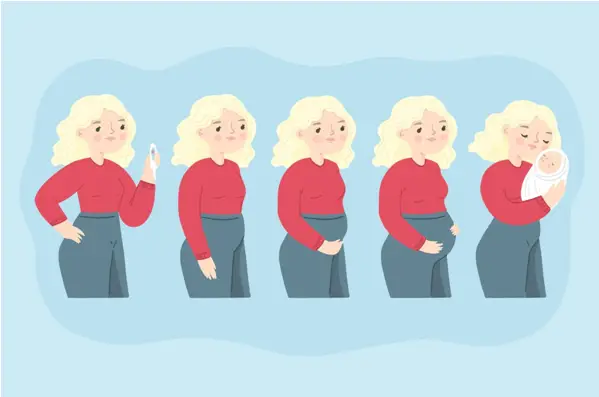Pregnancy Risks By Age Chart
Pregnancy is a wonderful and life-changing experience for many women. However, pregnancy does come with its own set of risks, and these risks can vary depending on a woman’s age. In this article, you will know the pregnancy risks by age chart and different risks associated with pregnancy at different ages.
In general, women in their 20s and early 30s tend to have the lowest risk of pregnancy complications. However, after the age of 35, a woman’s risk of complications increases significantly. This is because as a woman ages, her body undergoes natural changes that can make it more difficult to conceive and carry a healthy pregnancy. Here are some of the common risks associated with pregnancy at different ages:
Pregnancy Risks for Women in Their 20s
Women in their 20s tend to have the lowest risk of pregnancy complications. This is because they are typically in good health and have not yet experienced the natural changes that come with ageing. However, there are still some risks associated with pregnancy in this age group. These include:
- Miscarriage – The risk of miscarriage in women in their 20s is around 15%. This is the same risk for women in their 30s, but it increases to around 25% for women in their 40s.
- Preterm birth – Women in their 20s have a higher risk of preterm birth than women in their 30s or 40s. About 12% of pregnancies in women in their 20s result in preterm birth.
- Gestational diabetes – Women in their 20s have a lower risk of developing gestational diabetes than women in their 30s or 40s. However, the risk is still present and increases with age.
Pregnancy Risks for Women in Their 30s
Women in their 30s have a higher risk of pregnancy complications than women in their 20s. This is because as a woman ages, her fertility declines and her body undergoes natural changes that can make it more difficult to conceive and carry a healthy pregnancy. Some of the risks associated with pregnancy in this age group include:
- Miscarriage – The risk of miscarriage in women in their 30s is around 15%. This is the same risk for women in their 20s, but it increases to around 25% for women in their 40s.
- Ectopic pregnancy – Women in their 30s have a higher risk of ectopic pregnancy than women in their 20s. This is a potentially life-threatening condition in which the fertilised egg implants outside of the uterus.
- Preterm birth – Women in their 30s have a lower risk of preterm birth than women in their 20s. However, the risk is still present and increases with age.
- Gestational diabetes – Women in their 30s have a higher risk of developing gestational diabetes than women in their 20s.
Pregnancy Risks for Women in Their 40s
Women in their 40s have the highest risk of pregnancy complications. This is because as a woman ages, her fertility declines and her body undergoes natural changes that can make it more difficult to conceive and carry a healthy pregnancy. Some of the risks associated with pregnancy in this age group include:
- Miscarriage – The risk of miscarriage in women in their 40s is around 25%. This is higher than the risk for women in their 20s or 30s.
- Chromosomal abnormalities – Women in their 40s have a higher risk of giving birth to a baby with chromosomal abnormalities, such as Down syndrome.
- High blood pressure and preeclampsia – Women in their 40s have a higher risk of developing high blood pressure and preeclampsia during pregnancy. These conditions can lead to serious complications for both the mother and the baby.
- Placenta previa – Women in their 40s have a higher risk of developing placenta previa, a condition in which the placenta covers the cervix. This can lead to heavy bleeding and may require a c-section delivery.
- Gestational diabetes – Women in their 40s have a higher risk of developing gestational diabetes than women in their 20s or 30s.
- Multiple pregnancies – Women in their 40s have a higher risk of giving birth to twins or other multiples. Multiple pregnancies are associated with a higher risk of complications, such as preterm birth and gestational diabetes.
It’s important to note that while these risks are higher for women in their 40s, many women in this age group still have healthy pregnancies and give birth to healthy babies. However, it’s important for women in their 40s to be aware of these risks and to work closely with their healthcare providers to monitor their health and the health of their baby throughout pregnancy.
Conclusion
Pregnancy risks vary depending on a woman’s age. While women in their 20s tend to have the lowest risk of complications, women in their 30s and 40s are at higher risk for certain complications. It’s important for women of all ages to receive prenatal care and to work closely with their healthcare providers to monitor their health and the health of their baby throughout pregnancy.
Read More: What Are The Benefits Of Ginger For Men?

